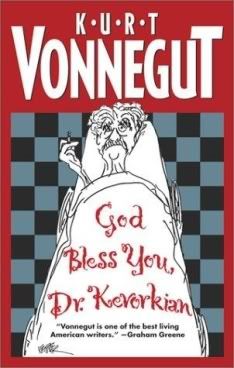 In his novella, God Bless You, Dr. Kevorkian, Kurt Vonnegut combines humorous fiction with sobering reality to create bizarre stimulating text. In this short book Vonnegut is killed and revived twenty-one times by Dr. Jack Kevorkian in the ‘state-of-the art lethal injection execution facility at Huntville, Texas.’ These temporary deaths provide Vonnegut the opportunity to interview people in heaven. God Bless You delivers classic Vonnegut sarcasm and wit while offering simple stories that encompass everything good about life. It’s iconoclastic Confucius - the Tao of Dennis Miller.
In his novella, God Bless You, Dr. Kevorkian, Kurt Vonnegut combines humorous fiction with sobering reality to create bizarre stimulating text. In this short book Vonnegut is killed and revived twenty-one times by Dr. Jack Kevorkian in the ‘state-of-the art lethal injection execution facility at Huntville, Texas.’ These temporary deaths provide Vonnegut the opportunity to interview people in heaven. God Bless You delivers classic Vonnegut sarcasm and wit while offering simple stories that encompass everything good about life. It’s iconoclastic Confucius - the Tao of Dennis Miller.The book’s introduction is an A.D.D. trip through Kurt Vonnegut’s mind. A synapse fires and topics change – non-sequiturs abound. The preface randomly offers family history, blunt opinions, intelligent humor and irony - like a humanist conducting ethereal interviews. Vonnegut may as well be George W. Bush at an Amnesty International meeting. Oil and water come to mind. Vonnegut goes on to discuss cigarettes, guns, sex, marriage, his Uncle Alex, Isaac Asimov’s funeral, and then abruptly ends the preface with ‘See you later, Alligator.’
After a while, Crocodile, the interviews begin. Vonnegut’s interviewees range from Newton to Shakespeare to Hitler. Yes, Hitler. There is no hell in Vonnegut’s afterlife - everyone goes upstairs. Vonnegut interviews the radiologist poet, Dr. Philip Strax, who pioneered breast cancer research and wrote the famous verse ‘Tis better to have love and lust / Than let our apparatus rust.’ Vonnegut’s final interview explains how fellow humanist Isaac Asimov was able to pen a staggering 800 books. Asimov found the time to write prolifically because ‘Hell is other People.’
Vonnegut’s timeliest interview is with Carla Faye Tucker, ‘a born-again murderer.’ The state of Texas executed Carla Tucker moments before one of Vonnegut’s heavenly expeditions. So it goes. At the Pearly Gates, Carla told Vonnegut that it was a shame there wasn’t a hell because ‘she would be glad to go to hell if only she could take the governor of Texas with her.’ ‘He’s a murderer, too,’ She said. ’He murdered me.’
Vonnegut’s writing is quirky and entertaining, but also political and compassionate. He discusses the genocide of Tasmanian aborigines, African-American slavery and corrupt legal systems. He poignantly notes that Thomas Jefferson wrote ‘All men are created equal’ while owning slaves. Vonnegut interviews his Socialist hero, Victor Eugene Debbs and passes along his favorite Debbs quotation: As long as there is a lower class, I am in it. As long as there is a criminal element, I am of it. As long as there is a soul in prison, I am not free.
There are too many interviews to mention, but all are interesting and insightful. God Bless You isn’t Kurt Vonnegut’s best work, but it’s a good introduction to a unique author who defies definition and challenges conventional thought. Slaughterhouse Five, Fates Worse than Death and Breakfast of Champions are better Vonnegut, but God Bless You, Dr. Kevorkian still raises eyebrows, incites chuckles and expands the mind. It may even make you think, ‘If this isn’t nice, what is?’ - like Uncle Alex used to say.
...
*Originally published in the Charleston City Paper.
